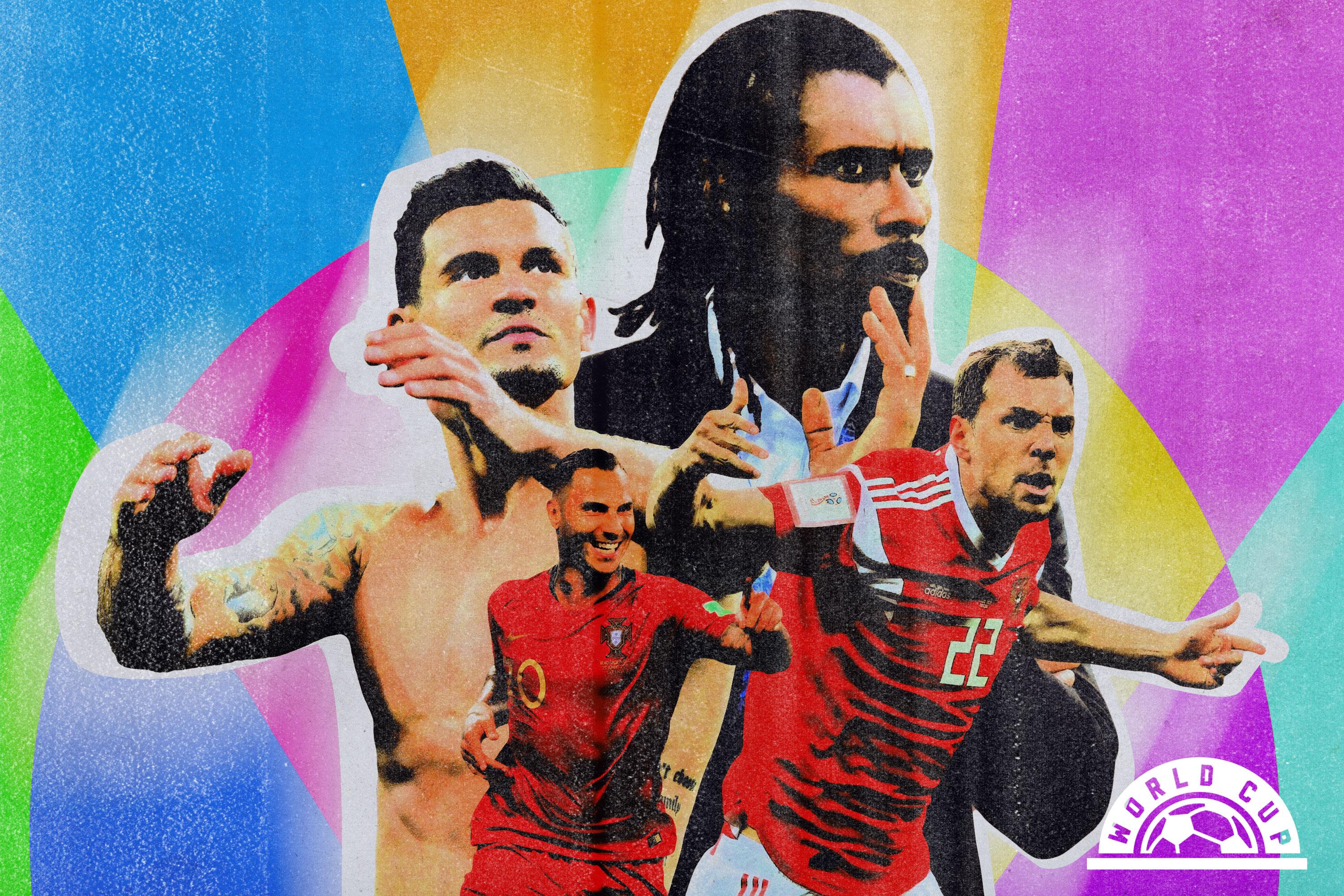
World Cup summers allow us to revel in the celebrated superstars of soccer every four years, but they also birth new heroes. Some have been hiding in plain sight; others toil in faraway domestic leagues. There are a few who you likely never even heard of before this month. Not all of the players (and coach) listed below will feature in the knockout round, which begins Saturday, but each made an indelible impact on their groups in the preliminary stage. To them, and to all: We’ll always have Russia.
Group A — Artem Dzyuba, Russia
Rodger Sherman: Russia’s defining characteristic is its sheer size. It’s the world’s largest country, with 11 time zones and enough steppes for a staircase. It’s fitting that the most charismatic player on the country’s first trip to the knockout round of a World Cup since the breakup of the Soviet Union is Russia’s Siberia-sized striker Artem Dzyuba, a Tsar Bomba of a man.
Dzyuba wasn’t expected to play much of a role for the Russians—he’d only played 107 minutes for the national team since Euro 2016. Plus, he has a bit of an anti-authoritarian streak that’s put him at odds with managers: He once referred to his coach at Spartak Moscow as “a little coach”—he’s very focused on size—and he once paid $80,000 to play against Zenit St. Petersburg after they put him on loan. He made fun of Russia manager Stanislav Cherchesov’s mustache after being left off the squad for last year’s Confederation Cup.
But he got the nod for the World Cup and was subbed on in the opening game against Saudi Arabia. Less than a minute later, somebody had kicked the ball in the direction of the monumental Dzyuba, and he headed it home. He scored again vs. Egypt, once again displaying the gravitational pull of his massive body on a long ball, but this time showing deft control and footwork to turn and fire.
It’s hard to root for Russia. You can’t really separate politics from sports with a nation just four years removed from a government-sponsored doping program with a dictator who sees sports as a method of projecting power—and shows up at the games. But the sheer joy of an enormous athlete celebrating has managed to transcend my geopolitical beef.
Group B — Ricardo Quaresma, Portugal
Paolo Uggetti: In some places, the shot is commonly known as a trivela. In others, it is known as a tres dedos (three toes) finish, or more simply put: an outside-the-boot shot. The effect is an inverted curve, the ball convexing instead of concaving as it takes defenders and the keeper alike by surprise. When I played high school soccer, it was my preferred shooting model. It is Ricardo Quaresma’s money-maker:
The 34-year-old Portuguese winger played only 21 minutes as a sub through the first two games of the World Cup, and mostly languished on the bench while his most ardent supporters made a case that he just needed a start to make a difference. In Portugal’s third game, wherein they needed a win to ensure passage to the next round, Quaresma got his shot, and of course, he spun it from his boot to the back of the net the way he does best:
This is a man who has tattooed two tears on his face, while also tattooing a Bible verse on his back of his head. He didn’t make the final roster for the last three World Cups, but is finally getting a chance to make his mark in the twilight of his career. It’s about time the trivela and its foremost connoisseur got face time on the world’s biggest stage.
Group C — Paolo Guerrero, Peru
Michael Baumann: Peru was a surprise survivor of South America’s arduous qualifying campaign, and arrived in Russia as an unknown entity, expected to go three-and-out. Their one bit of distinctive trivia was captain Paolo Guerrero’s positive cocaine test, which was blamed on Guerrero drinking coca tea and led to a ban that was appealed, upheld, and then lifted after the captains of the other teams in Peru’s group (Denmark, France, and Australia) wrote a letter of support. Guerrero, a former Hamburg and Bayern Munich striker, started Peru’s opening game against Denmark on the bench, and in his absence Peru put on a dazzling display of aggressive, devil-may-care soccer in front of a surprisingly large contingent of Peruvian fans. But Christian Cueva ended the first half with an all-time penalty miss and in the 59th minute, Denmark’s Yussuf Poulsen scored.
On came Guerrero, burly, tattooed, and thinly mustached, looking mean and hardened but heroic, like the reformed world-weary henchman tasked with protecting a child in an action movie. Within minutes, Guerrero came within a whisker of a backheel equalizer, rendering Denmark keeper Kasper Schmeichel helpless, but Guerrero put just enough English on the ball to roll it wide. If it had gone in, it would’ve been the goal of the tournament. Peru’s World Cup dream ended in the next match against France, but Guerrero finally got his hero’s moment against Australia.
It may have been too little, too late, but Guerrero will still go down as the face of a fan favorite that couldn’t quite find its attacking edge.
Group D — Dejan Lovren, Croatia
Zach Schwartz: Up until a few months ago, Lovren’s inconsistent performances left Liverpool fans screaming for the club to bench the Croatian center back. It got so bad that he was subbed off after 31 minutes last October for being at fault for two goals against Tottenham. But after Liverpool bought £75 million defender Virgil van Dijk in January, a sense of calm was restored to the back line and Lovren began to flourish.
Lovren’s newfound form has been parlayed into a terrific World Cup for his country. He has helped anchor a Croatia defense that has yet to concede a goal from open play. In the last game of his Liverpool campaign, Lovren defended against Cristiano Ronaldo; in the first match of the World Cup he faced Lionel Messi—neither of them managed to score. With Croatia’s side of the knockout draw looking increasingly favorable, Lovren may be returning to Anfield as a national hero.
Group E — Sergej Milinkovic-Savic, Serbia
Miles Surrey: I’m partial to athletes who don’t necessarily look the traditional part of a superstar—to wit: Switzerland’s Xherdan Shaqiri gives the impression of guy pining for a fight on the Jersey shoreline—and my new large adult soccer son is Serbian midfielder Sergej Milinkovic-Savic. This guy is basically the sport’s equivalent to fellow Serb Nikola Jokic: a giant with awkward cadence who is able to conjure intricate passes out of nothing like a seemingly out of shape Paul Pogba. (He’s capable of spectacular goals to boot.)
What I’ll telling you is not news; in fact, I’m probably the last person that can fit on the Milinkovic-Savic bandwagon—The Ringer’s own Donnie Kwak lovingly refers to him as “23-Savic,” and powerhouses like Juventus and Real Madrid are close to prying him away from Lazio. The 6-foot-4 midfielder may have felt a bit of the burden of hype in Serbia’s 2-0 loss to Brazil on Wednesday, which knocked the Serbs out of the World Cup. But at 23, he’ll have plenty of chances to be the Slavic messiah in future competitions—and Lazio is still in line to acquire a small nation’s GDP in his stead.
Group F — Cho Hyun-woo, Korea
Donnie Kwak: Two years ago, Cho was an unknown keeper playing in the second division of Korea’s domestic soccer league. On Wednesday, in the heady hours after Korea’s stunning 2-0 win over Germany, Cho’s Wikipedia page described him as a “Mexican savior and god.” (The memes soon followed.) It was, in fact, Cho’s Man of the Match, six-save performance in Kazan against the Germans that helped assure Mexico a backdoor passage into the knockout rounds. But Cho, who was a surprise World Cup starter for Korea, had caught the eye before shutting out Germany. Over the course of three matches, playing behind a leaky Korean backline, Cho faced a barrage of shots but conceded only one goal from open play. His rangy athleticism and confident demeanor in a tournament marked by dodgy goalkeeping suggest that Cho’s dream move to England isn’t so far-fetched. If that fails, Guadalajara or Monterrey could probably use a savior.
Group H — Aliou Cissé, Senegal
Shaker Samman: Sixteen years ago, in the opening game of the 2002 World Cup, Senegal shocked the soccer world. Led by their captain, Aliou Cissé, the Lions of Teranga bested the defending champions France, and salvaged draws with Denmark and Uruguay to advance to the knockout stages in their first-ever World Cup. After beating Sweden in the round of 16, Cissé and his countrymen held Turkey scoreless for 90 minutes in the quarterfinal before a stunner sent them home in extra time. Now, in Senegal’s first trip back to the tournament since that storied run, Cissé is here, once again, to lead them to glory.
In a tournament marred by poor coaching performances from unlikely sources (*cough* Jorge Sampaoli and Jogi Löw *cough*), Cissé has been something of a star. When the draw was revealed in December, he mentioned that his team’s group would present a challenge. And thanks to his pragmatism and tactical acumen, it’s one they’ve met with gusto. After beating Poland 2-1 in their opener and drawing Japan 2-2 on Sunday, Senegal needs just a draw with Colombia on Thursday to advance to the knockout stages. At 42, Cissé is the youngest coach in the tournament. He is also the only black coach in the tournament, and if the internet is to be believed, the only one who can claim to be a sex symbol. Sorry, Hervé Renard, but we’re not seeing that many memes of you lately.
Group G — Felipe Baloy, Panama
Micah Peters: The strange thing about group stage soccer at big international tournaments is that moral victories feel and look like actual victories. Take Panama, for instance, who are playing their very first World Cup, and through one and three quarters matches hadn’t managed to notch a single goal. They were also on the business end of a 6-0 drubbing against England on Sunday and definitely going home when Felipe Baloy got the jump on a dozing defense and put a sliding half volley past Jordan Pickford. Ordinarily there would be no scenes, and yet, there were scenes. Panama had their first-ever World Cup goal, and Baloy became a national hero.
England pleaded offsides, by the way. The monsters.


